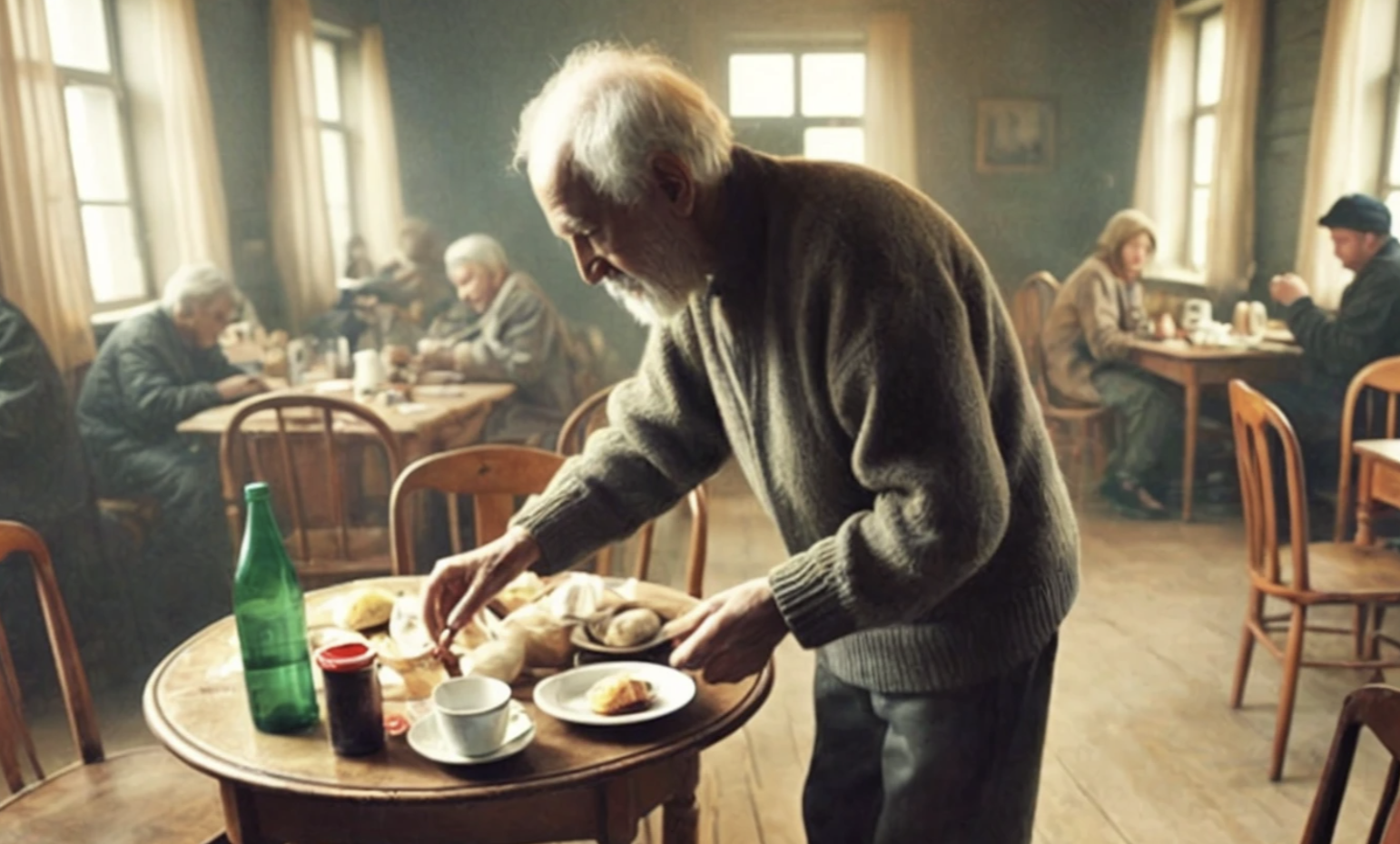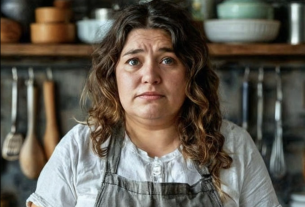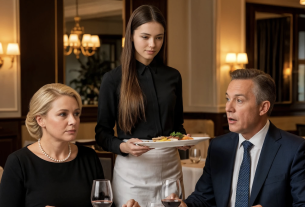Dmitry, a young chef, got a job at a small restaurant on the outskirts of town. The place was cozy, with windows overlooking a street where cars occasionally passed by. Inside, the aroma of freshly baked bread and spices always lingered. Dark wood furniture added a homey feel to the place. However, being on the outskirts meant there weren’t as many visitors as one might wish.
For Dmitry, this job was not just a way to earn a living. He dreamed of someday opening his own business, a small restaurant with soul. So here, even in this quiet corner of the city, he hoped to learn everything from working with the menu to interacting with guests.
The team turned out to be tiny but uniquely vibrant.
Svetlana, a bustling waitress, could simultaneously take an order, pour tea, and answer calls. Gena, the dishwasher, was grumpy but kind, especially when someone helped him carry heavy boxes. And of course, there was the elderly chef Mikhail Semyonovich.
Mikhail Semyonovich was a legend of this restaurant.
He had been working there longer than anyone else, was reserved, focused on his job, knew many recipes, and could surprise nearly every guest. But he had one strange habit of always being the last to leave the restaurant.
He invariably carried a small bag of food with him.
Initially, Dmitry thought that the senior colleague was just trying to save money. After all, times were tough, and prices for groceries were rising. But soon, he started noticing oddities. Mikhail Semyonovich took home food that was usually not allowed to be taken: leftovers like soup, a piece of pie, even salads that hadn’t been served to guests.
«Maybe it’s for someone?» Dmitry wondered. It made sense. Perhaps he was helping someone from his family? But why then did he pack the food so cautiously, as if he didn’t want anyone to notice?
Dmitry tried to find an explanation, but the questions kept multiplying. Every time Mikhail Semyonovich approached the door with that same bag, Dmitry felt the urge to ask, but he restrained himself. «It seems awkward,» he convinced himself.
One day, he stayed late at the restaurant and realized it was a sign, so he began to wait. The wait wasn’t long.
The old man, as usual, gathered the bags of food and headed for the exit. Dmitry threw on his jacket and followed him, drawing no attention.
Mikhail Semyonovich walked confidently, though his demeanor suggested that he took this route every evening. Dmitry kept his distance, now closing in, now falling back, not to give himself away.
The streets they walked became quieter. Soon, they reached an old park. No one had walked there in a long time: the paths were overgrown with grass, and the lamps barely glowed. Only the rare creak of swings broke the dead silence.
Mikhail Semyonovich headed for a bench in the far corner of the park. Dmitry hid behind a tree, watching from a distance. Within a few minutes, children began to approach the old man. First a skinny boy about seven years old in a torn jacket. Then two girls holding hands, as if afraid to get lost in the dark. Then a few more children followed. Their faces were gaunt, their clothes clearly second-hand and ill-fitting.
The old man took the food out of the bags. He distributed it to the children calmly, with a smile, as if he had done it a thousand times. At first, there was complete silence, only the rustle of the bags. Then the children began to thank him.
«Thank you, Uncle Misha!» suddenly rang out.
Mikhail gently patted a girl on the head; she shyly smiled and clutched a piece of bread to herself.
When the distribution ended, the old man stood up, gathered the empty bags, and walked back. The children quickly dispersed, vanishing into the darkness. Dmitry waited until Mikhail Semyonovich had left, and only then did he head home. His mind was filled with many thoughts.
The next day, he couldn’t hold back anymore.
«Mikhail Semyonovich, did you go to the park yesterday?» he asked cautiously as soon as they were alone in the kitchen.
The old man frowned but didn’t pretend not to understand.
«You saw, huh?» he said after a short pause.
Dima nodded. He felt awkward, as if he had intruded on something personal.
«Has it been going on for long?» he asked, unsure of how to continue.
Mikhail Semyonovich sighed, looking out the window.
«Several years now,» he replied quietly. «Those children… They’re nobody’s responsibility. They live somewhere, scraping by as best they can. And I… I can do something for them.»
Dima didn’t know what to say. He felt ashamed of his previous thoughts and touched by witnessing such an act. There was a sadness in the old man’s eyes, but also a kind of strength, as if this task had become his life’s purpose.
«How did you start?» Dima asked.
Mikhail Semyonovich smiled faintly.
«I lived nearby, saw how they were starving. Thought I’d just bring some food a couple of times. Then I realized: if not me, then who?»
Dima stood, stunned. He had never met people who did something like this simply for the sake of it, without any personal gain.
Mikhail Semyonovich’s words lingered in Dima’s mind. That evening, lying in bed, he pictured the faces of those children. How they rejoiced over hot food, how they looked at Mikhail Semyonovich with gratitude. The feeling haunted him.
The next day, during lunch, he approached the old man, who was slicing onions.
«Mikhail Semyonovich, let’s try together,» he started, trying to speak calmly so as not to sound imposing. «I can cook portions specifically for them.»
Mikhail Semyonovich paused for a moment, then wiped his hands on a towel and looked at Dima intently:
«Are you serious?»
Dima nodded.
«Absolutely. It’s important. You have a good thing going, but it’s hard alone. Together, it will be easier.»
The old man squinted skeptically, as if testing the boy’s sincerity. Finally, he smiled, took a piece of onion from the board, and ate it.
«Well, if you really care, let’s try.»
That’s how their friendship began. After shifts, when the restaurant closed, they stayed together in the kitchen. Mikhail Semyonovich taught Dima to cook simple, but nourishing dishes: soups, pasta with stew, porridge.
«The main thing is that it’s filling and easy to digest,» he said, stirring a huge pot. «These kids sometimes go two days without eating. They need warmth, not delicacies.»
Dima listened, diligently repeated, and offered his own ideas.
«What if we add some vegetables? It’ll be healthier.»
«Sure, throw in a carrot if you find one,» Mikhail Semyonovich chuckled. «Just don’t get carried away. This isn’t about the restaurant.»
Over time, Dima suggested using leftovers that weren’t needed in the restaurant. These were pieces of bread, some meat, or vegetables that were no longer suitable for clients but were perfectly fine for cooking. Mikhail Semyonovich was initially hesitant:
«Did you tell the chef?»
«I did. He approved,» Dima confidently replied. «He says it’s better than throwing it away.»
Every evening, they packed food into containers and went to the park. Dima saw for the first time how the children joyfully greeted Mikhail Semyonovich. They ran to him, hugged him, and called him «Uncle Misha.» Dima became a new person to them, initially met with suspicion.
«Who are you?» asked a boy about ten years old.
«A friend,» Dima smiled, handing him a container. «And now I’ll be coming more often.»
The children laughed, ate right there, not waiting for the food to cool. Mikhail Semyonovich sat nearby, patting someone on the head and telling funny stories. Dima realized that these evenings meant more to him than work. Each time, seeing how the kids enjoyed the food, he felt he was doing something truly important.
Soon, passersby began to approach them. Some nodded silently, others brought their own food. One man once handed over a bag of warm clothes:
«This is for you. The children need it more than I do.»
Dima watched as the children tried on mittens, while Mikhail Semyonovich chuckled as if it were all commonplace for him.
«You see for yourself,» he said one day as they walked home after the distribution. «People are ready to help. You just have to start.»
Dima reflected on this. He could no longer imagine living without these evenings.
A couple of weeks later, local residents learned about their little kitchen. At first, it was solitary glances from afar—someone noticing how Mikhail Semyonovich and Dima came out with bags in the evening and returned without them. Then one of the neighbors, an elderly woman in a floral scarf, decided to approach.
«Young men, what are you doing here?» she asked, squinting her eyes.
Mikhail Semyonovich replied with a smile:
«We’re feeding the children, Baba Shura. You see, there are so many of them hungry.»
Baba Shura nodded approvingly. The next day she came to the restaurant with two jars of jam and a bag of groats.
«Here, take it. I always have extra, and where do my husband and I need so much? But the kids can use it.»
This moment was a turning point. Neighbors began to bring what they could: potatoes, canned goods, pasta. One day Svetlana, the waitress, noticing how much food there was, suggested:
«How about I bake some pies? My mom makes them, and everyone loves them.»
Mikhail Semyonovich was pleased:
«Pies are good. Kids love sweets.»
Dima watched everything unfolding with mild bewilderment. He had no idea how quickly people could come together. Just a week ago, he and Mikhail Semyonovich were alone trimming leftovers and reheating porridge, and now they had almost a real team.
One of the neighbors suggested going further. A man from the next building, stocky and with a loud voice, came up with an idea:
«I have an empty garage. If you want, we can cook there, make more.»
«Thank you, but it’s more convenient here,» Dima replied.
«Then at least put up a tent,» the neighbor persisted. «It will be a place for distribution.»
Thus, a small tent appeared in the restaurant’s courtyard. Another local resident, having heard about the kitchen, brought an old but still sturdy structure from his storeroom.
The tent became the center of their activities. Now people could come not only for food but also to talk, to find out how to help. One man brought several boxes of children’s clothes, and a young couple brought toys.
Dima was increasingly amazed each day. He thought people were rarely willing to share, but what he saw suggested the opposite. When one of the volunteers suggested organizing a campaign and writing about their initiative on social media, he was a bit nervous:
«What if they start criticizing? Say it’s all for publicity.»
«So what?» shrugged Svetlana. «The main thing is that the children are fed.»
The post gathered more likes than they expected. People began to write, call, and ask what was needed. One woman sent money to buy groceries, and someone from another city sent children’s books.
Soon, not only neighbors but people from other districts were talking about the kitchen. It was inspiring, but it also added responsibility.
One thing united them all – the desire to help. «They just needed someone to make the first step,» thought Dima, packing freshly baked pies into a box.



